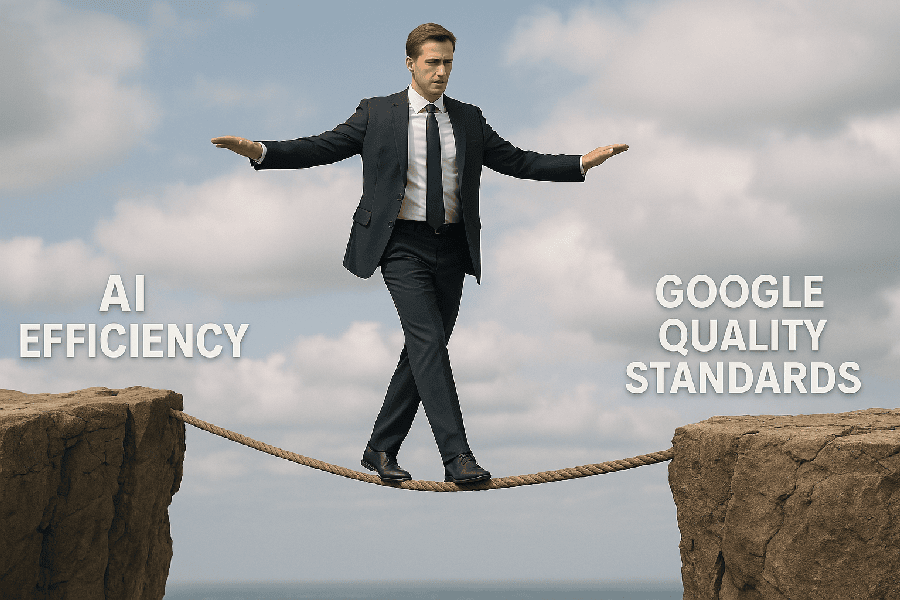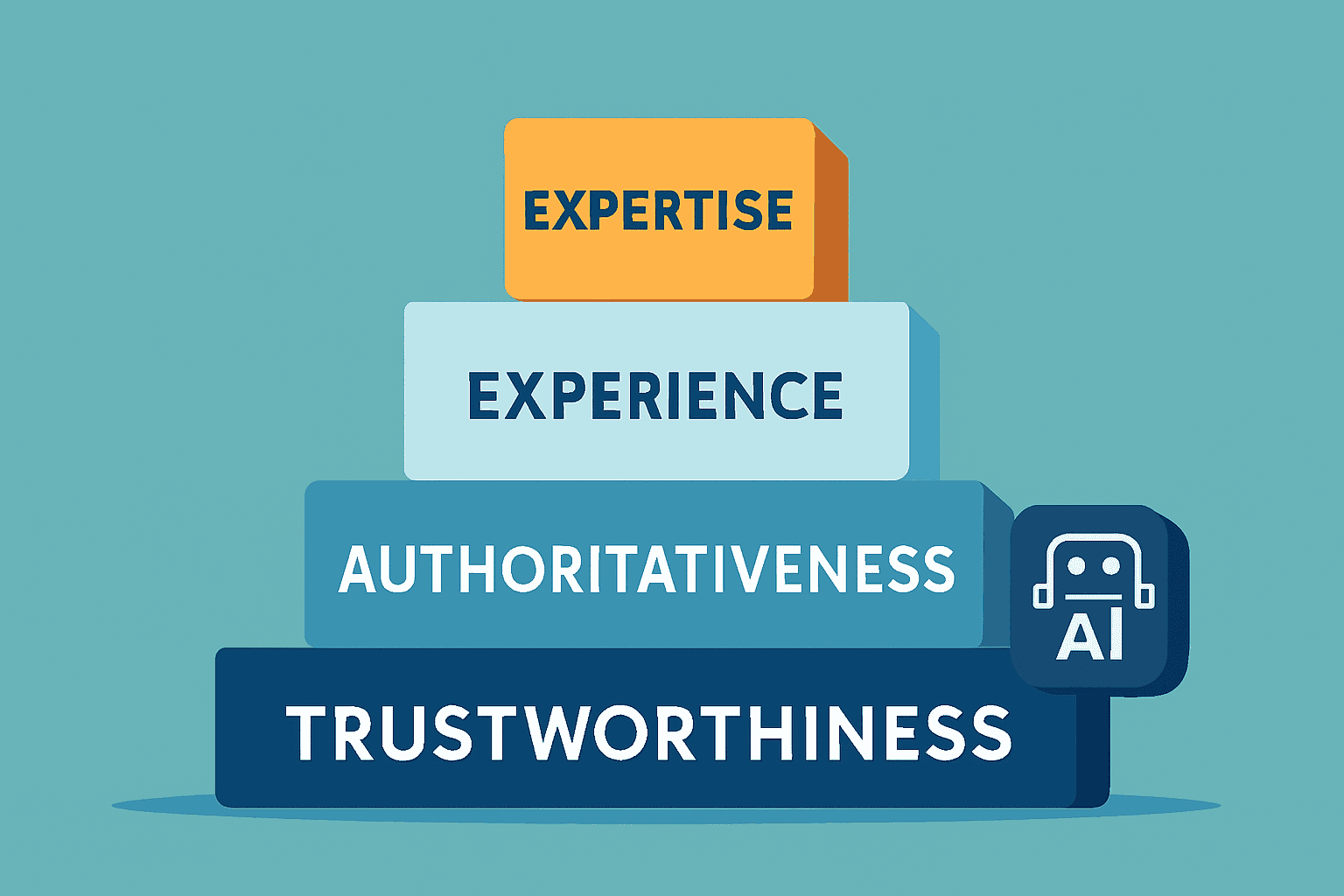Google and AI Content: Walking the Tightrope in Affiliate Marketing

AI-generated content has become both a powerful tool and a potential minefield for affiliate marketers. Google’s stance on AI content, while evolving, sends mixed signals that require careful navigation. Drawing from Google’s official guidance and recent updates to their Search Quality Evaluator Guidelines, we examine what this means for affiliate marketing professionals looking to maintain competitive edge without falling afoul of search algorithms.
The Official Line: Quality Over Production Method
Google’s position, first officially articulated in February 2023, emphasizes that content quality trumps production method. “Our focus on the quality of content, rather than how content is produced, is a useful guide that has helped us deliver reliable, high quality results to users for years,” states Google’s Search Quality team.
This sentiment appears straightforward: use AI if you wish, but don’t expect special treatment—or penalties—solely based on how your content was created. Google maintains that their systems are designed to reward content demonstrating E-E-A-T (Expertise, Experience, Authoritativeness, and Trustworthiness), regardless of whether it came from human writers or sophisticated AI tools.

Reading Between the Lines: The January 2025 Update
However, the January 2025 update to Google’s Search Quality Evaluator Guidelines tells a more nuanced story. The document mentions AI twenty times and provides clearer boundaries around acceptable use. Most tellingly, Google now explicitly states that “The Lowest rating applies if all or almost all of the MC (Main Content) on the page is copied, paraphrased, embedded, auto or AI generated, or reposted from other sources with little to no effort, little to no originality, and little to no added value for visitors.“
The operative phrase here is “little to no effort, originality, or added value.” This suggests that perfunctory AI generation—the “set it and forget it” approach some affiliates have adopted—will likely trigger penalties, while thoughtful implementation of AI as part of a creative process may still pass muster.
The Affiliate Dilemma
For affiliate marketers, this creates a challenging balancing act. The affiliate model often relies on producing content at scale across multiple niches, precisely the scenario where AI assistance becomes most tempting. Yet Google explicitly flags “scaled content abuse” as a serious concern, defining it as “the practice of generating large amounts of low-quality or unoriginal content, primarily to manipulate search rankings.“
This presents a clear warning to affiliate sites churning out product comparisons and reviews using minimally edited AI outputs. According to the latest guidelines, even if Google merely “strongly suspects” AI-generated scaled content after reviewing several pages, the lowest quality rating may be applied.
The Transparency Trap
Some affiliate marketers have adopted transparency as a strategy, adding disclaimers that acknowledge AI’s role in content creation. Counterintuitively, Google’s updated guidelines suggest this approach may backfire: “The website terms of use states that ‘some articles’ are generated by artificial intelligence and may have errors or be out of date; there is no indication to which pages this statement applies. The information in this article is not trustworthy and is Lowest E-E-A-T.“
This passage indicates that blanket AI disclaimers might actually undermine trust rather than build it, especially when coupled with liability waivers about content accuracy.
YMYL Content: A Special Warning for Financial Affiliates
Affiliates in the financial space face even stricter scrutiny. The guidelines are unambiguous: AI-generated content addressing Your Money or Your Life (YMYL) topics receives heightened evaluation. “This is spam (scaled content abuse) and a highly untrustworthy medical page: it demonstrates no real expertise and may not be correct and is especially concerning for YMYL topics,” states one example.
For financial product affiliates, this suggests that purely AI-generated content about investments, insurance, or credit products may face severe algorithmic penalties.
The FAQ Problem
Many affiliate sites use FAQ sections to capture long-tail search traffic. Google specifically calls out the practice of “gathering questions from sources like Google Search’s ‘People also ask’ feature and answering them with unoriginal, paraphrased content, often produced using generative AI tools” as deserving “the lowest” rating.
This directly challenges a common affiliate strategy of building out extensive FAQ sections with AI assistance to capture diverse query traffic.
The Path Forward: Strategic Integration
Despite these challenges, Google isn’t declaring war on AI content altogether. The key distinction appears to be between using AI as a shortcut versus using it as an enhancement tool.
For affiliate marketers, this suggests several strategic approaches:
- Experience-Led Content: As the guidelines note, “example-led content, with unique experiences that logically can’t be copied by others speaks volumes, and will be the future of content moving forward.” Affiliates who test products themselves and incorporate genuine experiences may find AI a valuable assistant rather than a replacement.
- Editorial Oversight: Using AI for initial drafts but having subject-matter experts substantially edit, enhance, and verify the content aligns with Google’s quality expectations.
- Value-Added Integration: Instead of publishing raw AI outputs, use the technology to compile data, identify patterns, or generate insights that human writers can incorporate into truly original analysis.
- Selective Application: Reserve human effort for high-value, competitive pages while judiciously using AI for supporting content—but ensure all content receives meaningful human enhancement.
The Bottom Line
Google’s evolving stance on AI content presents both challenges and opportunities for affiliate marketers. The search giant isn’t categorically against AI usage, but it’s increasingly sophisticated at detecting corner-cutting attempts to game the system through mass-produced, minimally edited AI content.
The affiliate marketers most likely to thrive under these guidelines will be those who view AI as one tool in a comprehensive content strategy—not as a replacement for human expertise, experience, and editorial judgment. As with many aspects of SEO, the sustainable path forward isn’t finding clever ways to circumvent quality guidelines, but rather aligning business practices with the user-centric philosophy that ultimately drives Google’s algorithms.
In the words of Google’s own guidance: “If you see AI as an essential way to help you produce content that is helpful and original, it might be useful to consider. If you see AI as an inexpensive, easy way to game search engine rankings, then no.“
For affiliate marketers, that distinction may well determine which sites thrive and which struggle in the increasingly AI-aware search landscape of 2025 and beyond.
AFFIVERSE is the leading source of insights for affiliate marketing professionals. This opinion piece reflects our analysis of publicly available information and should not be construed as legal or professional SEO advice.






